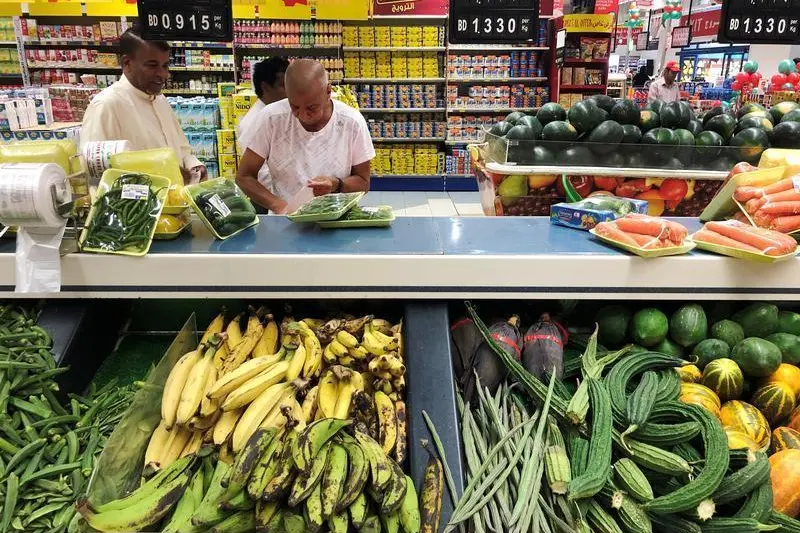PHOTO
Bahrain is ranked second among Gulf countries in a new index that provides a comprehensive overview of the food security sector.
The Global Food Security 2022 second quarter report is based on data collected from 171 countries until July 1 this year.
It was released by London-based market intelligence firm Deep Knowledge Analytics yesterday.
Nations are ranked on three parameters: Access to Food, Crisis Level, and Food System and Economy Resilience.
In the region, the UAE takes the lead as it is ranked 26th with a score of 7.07 out of 10, where the value closer to 0 shows a more insecure state in terms of food security.
Bahrain and Qatar are ranked 30th and joint second among the GCC with a score of 6.99, followed by Oman (6.77), Saudi Arabia (6.75) and Kuwait (6.69).
The top five nations are the US (7.90), Norway (7.89), Ireland (7.82) and the Netherlands and Canada (7.79).
“Ranking 30th out of 171 countries, Bahrain showcases considerable commitment to ensuring food security and food sufficiency,” Deep Knowledge Analytics director Alex Cresniov told the GDN yesterday.
“While the nation has not been affected to a large degree by the ongoing war in Ukraine due to generous subsidies from the government, its food security might be threatened by climate change and further disruption of supply chains.
“Therefore, government incentives for research in high-tech and alternative agriculture should continue to boost local production of staple foods in the kingdom.”
The GDN reported earlier this year that new initiatives to achieve food security in Bahrain include aqua-farming, animal and agriculture projects as well as increasing the production of poultry.
In total, BD400 million worth of projects are underway to establish hydroponic farms and 356 greenhouses – covering 260,000sqm of land – which will produce 3,600 tonnes of food annually.
Bahrain is ranked second in the Food System and Economy Resilience category with a score of 5.83 out of maximum of 7.7, with UAE (5.94) taking the lead. Oman is ranked third with a score of 5.33, Qatar (5.07), Saudi Arabia (4.61) and Kuwait (4.44).
Under the Access to Food category, Qatar takes the lead with a score of 8, followed by Saudi Arabia (7.96), the UAE (7.92), Kuwait (7.82), Bahrain (7.63) and Oman (7.55).
In the Crisis Level category, Bahrain is ranked fourth among Gulf countries with a score of 2.49 out of 6, with Qatar in first spot (2.09), followed by Kuwait (2.18), Saudi Arabia (2.32), Oman (2.57) and the UAE (2.65).
“The Middle East and North Africa (MENA) will remain as one of the most import-dependent regions in the world,” says the report.
“About 50 per cent of the region’s food is imported, and some progress in the field of agri-food technology is being made in a number of countries,” it adds.
Oman and the UAE are also listed among the list of MENA countries that face most ecological threats.
The report warns that the levels of hunger and food insecurity are expected to increase further by end of 2022, with 25 countries in Sub-Saharan Africa and MENA region considered ‘high risk’ and deteriorating.
“The MENA region, for instance, is extremely dependent on imports of food, especially wheat and other staple grains, so food is calorie-rich but nutritionally deficient,” it says.
“As a result, people suffer from the double burden of malnutrition: stunting and obesity.”
Struggle
Other alarming findings state that wheat prices are set to increase by 40pc this year as 36 countries import more than 50pc of their wheat from Russia and Ukraine.
The report highlights that most food insecure countries are located in Africa, a major importer of food, with millions are now in danger of being pushed into further malnutrition.
The top five food-stressed countries are Afghanistan, Central African Republic, Mozambique, Congo Democratic Republic and Somalia.
The farmers’ struggle with rising prices of fertilisers, strain on supply chains due to Covid-19, conflicts, countries enacting food-export restrictions and climate change are among the key factors that shock the food system globally, causing pressure on households’ income around the globe.
© Copyright 2020 www.gdnonline.com
Copyright 2022 Al Hilal Publishing and Marketing Group Provided by SyndiGate Media Inc. (Syndigate.info).





















